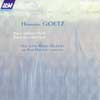Goetz Piano Quintet, Op 16 and Piano Quartet, Op 6
Elegant and committed performances of two neglected Romantic chamber works
View record and artist detailsRecord and Artist Details
Composer or Director: Hermann (Gustav) Goetz
Genre:
Chamber
Label: ASV
Magazine Review Date: 4/2004
Media Format: CD or Download
Media Runtime: 65
Mastering:
Stereo
Catalogue Number: CDDCA1157

Tracks:
| Composition | Artist Credit |
|---|---|
| Piano Quartet |
Hermann (Gustav) Goetz, Composer
Hermann (Gustav) Goetz, Composer Pro Arte Quartet |
| Piano Quintet |
Hermann (Gustav) Goetz, Composer
Hermann (Gustav) Goetz, Composer Paul Marrion, Double bass Pro Arte Quartet |
Author: Bryce Morrison
Although overshadowed by the major figures of his day, Hermann Goetz, who died of tuberculosis in 1876 at the age of 35, possessed enough attractive virtues to make the neglect of his Piano Quartet and Piano Quintet hard to understand. True, the influences of Schumann and, more particularly, Brahms (whom Goetz met in 1865) are paramount and yet the writing is characterful enough to make this issue – part of ASV’s enterprising chamber music series – an outstanding contribution to the catalogue.
Opus 16’s dark and austere opening and turbulent Allegro con fuoco mirror Goetz’s encroaching illness, though the gentle and pensive Andante con moto remembers the happier time of Op 6. And so, too, does the central Ländler of the following brusque Allegro moderato, while the intricately developed finale ends with what Malcom MacDonald, in his excllent accompanying essay, calls ‘hard-won optimism’.
Op 6 is much more open-hearted and less romantically ambivalent in style. And whether in the variations of the second movement – ‘beautifully melodious’ (Macdonald again) – in the Scherzo’s scotch-snap rhythms or in the good humoured E major conclusion to the finale, you are left in no doubt concerning Goetz’s ‘melodic gift, formal mastery and excellent command of his craft’.
ASV’s recording is finely balanced, particularly in the Quintet’s unusual combination of violin, viola, cello, piano and double bass, and the performances are as elegant as they are strongly committed.
Opus 16’s dark and austere opening and turbulent Allegro con fuoco mirror Goetz’s encroaching illness, though the gentle and pensive Andante con moto remembers the happier time of Op 6. And so, too, does the central Ländler of the following brusque Allegro moderato, while the intricately developed finale ends with what Malcom MacDonald, in his excllent accompanying essay, calls ‘hard-won optimism’.
Op 6 is much more open-hearted and less romantically ambivalent in style. And whether in the variations of the second movement – ‘beautifully melodious’ (Macdonald again) – in the Scherzo’s scotch-snap rhythms or in the good humoured E major conclusion to the finale, you are left in no doubt concerning Goetz’s ‘melodic gift, formal mastery and excellent command of his craft’.
ASV’s recording is finely balanced, particularly in the Quintet’s unusual combination of violin, viola, cello, piano and double bass, and the performances are as elegant as they are strongly committed.
Discover the world's largest classical music catalogue with Presto Music.

Gramophone Digital Club
- Digital Edition
- Digital Archive
- Reviews Database
- Full website access
From £8.75 / month
Subscribe
Gramophone Full Club
- Print Edition
- Digital Edition
- Digital Archive
- Reviews Database
- Full website access
From £11.00 / month
Subscribe
If you are a library, university or other organisation that would be interested in an institutional subscription to Gramophone please click here for further information.




